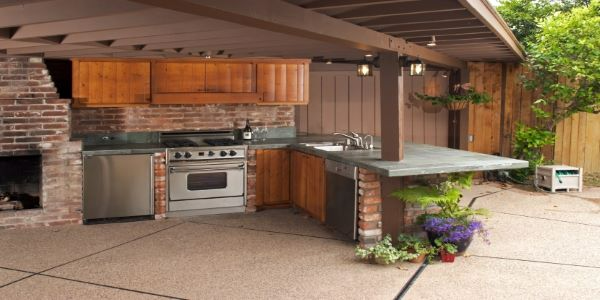How Weather and Temperature Can Affect Your Outdoor Appliances

If you have an outdoor kitchen, then late summer into fall is some of the best times of year to enjoy it. There’s nothing like a delicious cookout to cap off a pleasant summer or fall evening. However, if your outdoor kitchen is equipped with appliances, then heat, humidity, cold and ice can affect how well your outdoor appliances perform - and how long they last.
In this article, we will take a look at the ways that weather and temperature can have an adverse effect on outdoor appliances like your grill, fridge, ice maker, and dishwasher, as well as what you can do to minimize the effects.
Related Topic: How to Keep Your Outdoor Appliances Safe from the Elements
Outdoor Grill
You might not think that summer heat or cold weather can have a negative impact on your outdoor grill. After all, grills are designed to produce extreme heat, so why would outdoor temperatures hurt it? But the fact is that your outdoor grill can be hurt by high temperatures and extreme cold in a few ways.
If your grill runs on propane gas and your tank is subjected to direct sunlight it could create a potential hazard. A fuel tank in direct sunlight versus one in a shaded area could translate to a temperature difference of 30 degrees or more. Even an insulated tank left exposed to direct sunlight for an extended period could heat the fuel enough to cause an explosion.
Another aspect of summer heat that can hurt your grill is the extreme humidity that normally accompanies hotter days. Humidity, rain, snow and ice can all lead to premature rusting of your grill. Cold weather, snow and ice can also damage your grill. Extreme cold can crack rubber hoses and snow and ice that’s left sitting on your grill can rust your grill as it melts. As parts begin to rust, they deteriorate. Problems with a rusting grill can range from a few broken or malfunctioning parts to rust contaminating your food during preparation. Keeping your grill in a dry area and under a grill cover throughout the year is crucial to protect it from humidity, rain, snow, and ice.
Related Topic: How to Incorporate a Regular Grill into an Outdoor Kitchen
Outdoor Fridge
Your outdoor refrigerator is one appliance that is most susceptible to outdoor conditions. It can be negatively affected by both high heat and humidity and extreme cold. Your refrigerator works like an air conditioner in that it tries to maintain a consistent, preset temperature inside the unit. This ensures that the contents of your refrigerator stay fresh and safe to eat, and when you're ready for a cold drink, it’s actually cold. The hotter and more humid the weather gets outside, the longer and harder your refrigerator must work to maintain a consistent temperature. To keep it from overworking on those hot, humid days, make sure it’s clean on both the inside and outside. It's also important to make sure that there is plenty of space around the outside of the unit to ensure proper airflow and circulation.
During extreme cold weather parts of your refrigerator can freeze and stop working. The coils that help keep the interior of your frig cool can freeze during cold weather. This means your refrigerator will lose the ability to cool properly. If you live in an area that receives a fair amount of snow each winter, it could also cause problems. If there isn’t enough airflow and circulation around your refrigerator it can lead to ice buildups around the coils, which will make the unit work harder and eventually cause it to breakdown. The same thing happens if the coils and filter get too dirty. Making sure there is sufficient air flow around your refrigerator should keep it free of ice buildup and ensure it continues to work properly.
Outdoor Ice Maker
In many ways, your outdoor ice maker will face with the same obstacles as your refrigerator. The hotter it is, the harder your ice maker will have to work to keep producing ice. It’s important to take the same steps to protect your ice maker as your refrigerator.
Making sure that the coils and filter stay clean and maintaining a good amount of space around the perimeter of your ice maker will ensure proper upkeep and maintenance.
Outdoor Dishwasher
High heat may not affect the outside of your dishwasher very much, but it can affect the inside. If the weather outside gets too hot, it may result in the inside of your dishwasher overheating, which can lead to problems like unit damage, not cleaning dishes properly, or even personal injury.
Extreme heat can lead to the dishes inside the dishwasher getting extremely hot during the washing process. The dishwasher is meant to cool down at the end of a dishwashing cycle, but high heat might make this impossible. If the dishes inside get too hot, they could scald or burn your skin when you try to remove them.
High heat inside a dishwasher also encourages limescale buildup, which will result in your dishes not getting properly cleaned and disinfected. If the problem gets too bad, your dishwasher will become unsafe to use and must be replaced.
Get Professional Maintenance
If you have an outdoor kitchen or you’re thinking about getting one, make sure that you take care of your outdoor appliances. To make sure that this is done properly, it may be necessary to seek help from the professionals at Mr. Appliance. Mr. Appliance is a Neighborly company and will ensure the health of both you and your appliances. To make an appointment or get advice about how to care for your appliances, visit our website or give Mr. Appliance a call today!
 Click to call
Click to call


